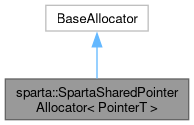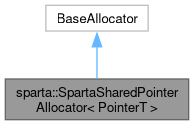A memory allocator complementing SpartaSharedPointer that reuses old memory. More...
#include <SpartaSharedPointerAllocator.hpp>


Public Types | |
| using | element_type = PointerT |
| Handy typedef. | |
| using | WaterMarkWarningCallback = std::function<void (const SpartaSharedPointerAllocator &)> |
| using | OverAllocationCallback = std::function<void (const SpartaSharedPointerAllocator &)> |
Public Member Functions | |
| SpartaSharedPointerAllocator (const size_t max_num_blocks, const size_t water_mark) | |
| Construct this allocator with num_blocks of initial memory. | |
| SpartaSharedPointerAllocator (const SpartaSharedPointerAllocator &)=delete | |
| Disallow copies/assignments/moves. | |
| SpartaSharedPointerAllocator (SpartaSharedPointerAllocator &&)=delete | |
| Disallow copies/assignments/moves. | |
| SpartaSharedPointerAllocator | operator= (const SpartaSharedPointerAllocator &)=delete |
| Disallow copies/assignments/moves. | |
| ~SpartaSharedPointerAllocator () | |
| Clean up the allocator – will warn if there are objects not returned to the allocator. | |
| size_t | getNumFree () const |
| Return the number of freed objects this allocator holds. | |
| size_t | getNumAllocated () const |
| Return the number of allocated objects this allocator allocated over time. | |
| bool | hasOutstandingObjects () const |
| Query to see if the allocator has any outstanding memory not yet returned. | |
| std::vector< const PointerT * > | getOutstandingAllocatedObjects () const |
| Return a vector of objects that have not been deleted/not yet returned to the allocator. | |
| void | registerCustomWaterMarkCallback (const WaterMarkWarningCallback &callback) |
| Set a custom watermark warning callback. | |
| void | registerCustomOverAllocationCallback (const OverAllocationCallback &callback) |
| Set a custom over allocation callback. | |
Friends | |
| class | SpartaSharedPointer< PointerT > |
| template<typename PtrT , typename... Args> | |
| SpartaSharedPointer< PtrT > | allocate_sparta_shared_pointer (SpartaSharedPointerAllocator< PtrT > &, Args &&...args) |
Detailed Description
class sparta::SpartaSharedPointerAllocator< PointerT >
A memory allocator complementing SpartaSharedPointer that reuses old memory.
First off, this allocator DOES NOT follow the semantics of std::allocator_traits. This is done on purpose to prevent others from using this class with std types like std::shared_ptr, std::vector, etc. Also, this class is not thread safe. Do not expect it to work in a threaded application where multiple threads are allocating/deallocating with the same sparta::SpartaSharedPointerAllocator<PointerT> instance.
Also, the allocator must outlive any simulator componentry that uses objects allocated by this allocator. If not, random seg faults will plague the developer. Suggested use is to make this allocator global, with user-defined atomic operations if desired.
Another suggestion for Sparta developers using these allocators is to create an Allocator class type that derives from sparta::TreeNode and place that class somewhere in the simulation under root:
And in the modeler's block, they would retrive the OurAllocators node and get the allocator:
The class is not intended to be used directly, but rather in compliment with the allocator method sparta::allocate_sparta_shared_pointer.
A typical use of this class is when a modeler is creating/destroying lots and lots and lots of little objects throughout simulation. Using the std::allocator or boost::pool_allocator does help, but not as much as this allocator, which is tuned/focused on the exact modeling use case.
As an example of a healthy performance uplift, the CoreExample saw a 20% boost in performance using this allocation coupled with the SpartaSharedPointer over using std::shared_ptr created via std::allocate_shared. See a performance example in the SpartaSharedPointer unit test.
To use this allocator, create a singleton of it in the application for the given type:
In runtime code, use allocate_sparta_shared_pointer method to allocate instances of the SpartaSharedPointer:
Use sparta::SpartaSharedPointer like a regular sparta::SpartaSharedPointer.
The allocator's constructor takes two arguments: a maximum number of blocks to allocate and a water mark. The maximum number of blocks is the hard upper limit of this allocator. Go beyond that and the allocator will throw an exception that it's "out of memory." If the allocator hits the watermark, it will warn that memory is dangerously close to being "used up." Watermark must be less than or equal to max_num_blocks.
The Allocator also keeps track of those objects in flight that have not returned to the allocator. Using the call to SpartaSharedPointerAllocator<PointerT>::getOutstandingAllocatedObjects, a modeler can determine which objects are still outstanding, where they might be, and help debug the situation.
Definition at line 154 of file SpartaSharedPointerAllocator.hpp.
Member Typedef Documentation
◆ element_type
| using sparta::SpartaSharedPointerAllocator< PointerT >::element_type = PointerT |
Handy typedef.
Definition at line 159 of file SpartaSharedPointerAllocator.hpp.
◆ OverAllocationCallback
| using sparta::SpartaSharedPointerAllocator< PointerT >::OverAllocationCallback = std::function<void (const SpartaSharedPointerAllocator &)> |
Used for defining a custom over allocation callback. Default is to throw an exception
Definition at line 167 of file SpartaSharedPointerAllocator.hpp.
◆ WaterMarkWarningCallback
| using sparta::SpartaSharedPointerAllocator< PointerT >::WaterMarkWarningCallback = std::function<void (const SpartaSharedPointerAllocator &)> |
Used for defining a custom watermark warning callback. Default is to print a warning
Definition at line 163 of file SpartaSharedPointerAllocator.hpp.
Constructor & Destructor Documentation
◆ SpartaSharedPointerAllocator()
|
inline |
Construct this allocator with num_blocks of initial memory.
- Parameters
-
max_num_blocks The maximum number of blocks this allocator is allowed to use water_mark The point where this allocator will warn (once) if allocation passes this threshold
Allocate a SpartaSharedPointerAllocator with a large block of memory (up front) to use during simulation for the PointerT type. The water_mark is a warning spot to help developers tune their allocations for their uses.
Definition at line 180 of file SpartaSharedPointerAllocator.hpp.
◆ ~SpartaSharedPointerAllocator()
|
inline |
Clean up the allocator – will warn if there are objects not returned to the allocator.
Definition at line 202 of file SpartaSharedPointerAllocator.hpp.

Member Function Documentation
◆ getNumAllocated()
|
inline |
Return the number of allocated objects this allocator allocated over time.
- Returns
- Number of allocated objects
This count should always be <= getNumFree()
Definition at line 225 of file SpartaSharedPointerAllocator.hpp.
◆ getNumFree()
|
inline |
Return the number of freed objects this allocator holds.
- Returns
- Number of freed objects
Definition at line 215 of file SpartaSharedPointerAllocator.hpp.
◆ getOutstandingAllocatedObjects()
|
inline |
Return a vector of objects that have not been deleted/not yet returned to the allocator.
- Returns
- vector of PointerT objects that still have reference counts > 0
Definition at line 242 of file SpartaSharedPointerAllocator.hpp.
◆ hasOutstandingObjects()
|
inline |
Query to see if the allocator has any outstanding memory not yet returned.
- Returns
- True if there are outstanding blocks not yet returned to the allocator
Definition at line 233 of file SpartaSharedPointerAllocator.hpp.
◆ registerCustomOverAllocationCallback()
|
inline |
Set a custom over allocation callback.
- Parameters
-
callback The callback to use when the allocator exceeds max blocks
The callback will be called only after the allocated exceeds the max blocks.
Definition at line 274 of file SpartaSharedPointerAllocator.hpp.
◆ registerCustomWaterMarkCallback()
|
inline |
Set a custom watermark warning callback.
- Parameters
-
callback The callback to use when the allocator hits the watermark
The callback will be called only once after the watermark was hit.
Definition at line 263 of file SpartaSharedPointerAllocator.hpp.
Friends And Related Symbol Documentation
◆ SpartaSharedPointer< PointerT >
|
friend |
Definition at line 274 of file SpartaSharedPointerAllocator.hpp.
The documentation for this class was generated from the following files:
- /github/workspace/sparta/sparta/utils/SpartaSharedPointer.hpp
- /github/workspace/sparta/sparta/utils/SpartaSharedPointerAllocator.hpp